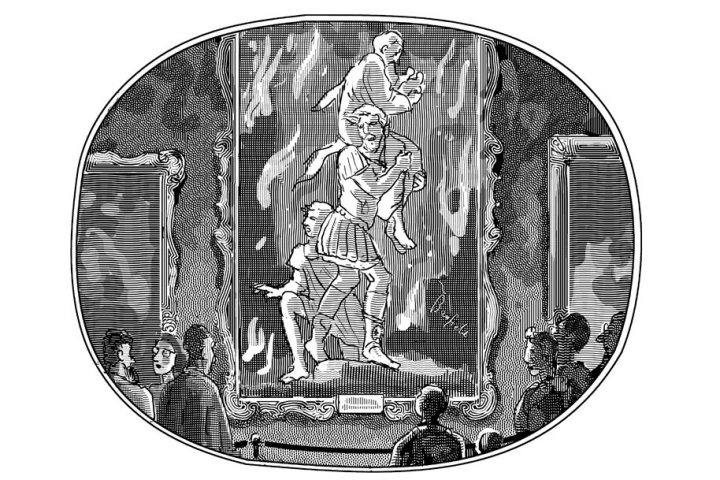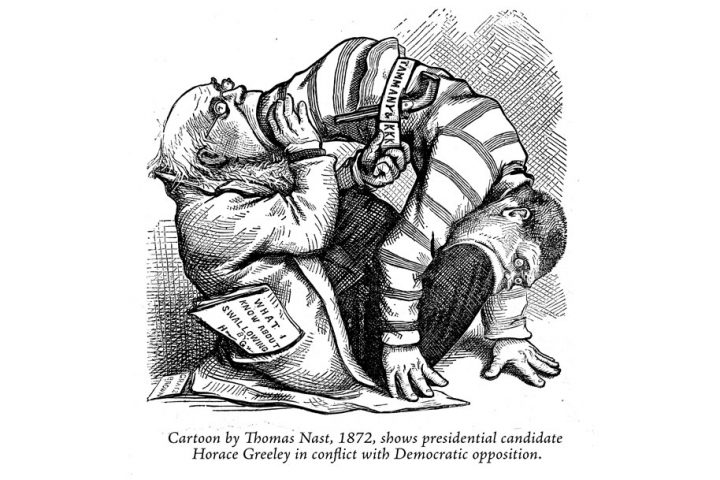I asked a friend of mine, well-informed and public-spirited, about the age of Joe Biden. She said, “He’s 78.” I said, “No, no, I mean the era of Biden, the epoch he will bestride and define. Any thoughts about that?” She replied, “He’s 78….”
I take her point, that it may be a little late for the age of Biden. But maybe it’s not too late to speculate about his importance as the second, or if you’re counting by presidential elections, the third act of the Obama era of modern liberalism.
Claiming his victory on the Saturday evening after the election, Biden paraphrased the memorable line from Obama’s 2004 debut speech at the Democratic National Convention. “I pledge to be a president who seeks not to divide, but to unify,” he said. “Who doesn’t see Red states and Blue states, only sees the United States.” Since no one recalls the Obama years as a golden age of unity and bipartisanship, the Biden era is going to have to be a big improvement.
One noticeable difference so far is rhetorical: Biden is more overtly religious than Obama. As a nice Catholic boy from Scranton who remains a faithful attender of Mass, Biden seems to think not (with apologies to George Will) that statecraft is soulcraft but that soulcraft is statecraft. Biden promises “to restore the soul and to secure the future of America,” in that order. To “end this uncivil war that pits Red against Blue,” he advises us to “open our souls instead of hardening our hearts,” to show “a little tolerance and humility.”
Biden showed his own humility by comparing himself to Abraham Lincoln signing the Emancipation Proclamation. “If my name ever goes into history it will be for this act, and my whole soul is in it,” Lincoln said on that occasion. Biden says, me too: “Today, on this January day, my whole soul is in this: Bringing America together. Uniting our people. And uniting our nation.”
The comparison would be stronger if, er, anyone thought Biden’s first day on the job signing executive orders was similar to the Great Emancipator, in the middle of the Civil War, emancipating millions.
But the notion that the president can restore our souls, and thus secure our future, is not new. Back in 2008, Michelle Obama used to say on the campaign trail that Barack “is the only person in this race who understands that before we can work on the problems, we have to fix our souls. Our souls are broken in this nation.” She was talking about Joe Biden and Hillary Clinton, among others, who were in the race against her husband.
***
In any case, it’s foolish to think that unity is in the cards. Americans have serious and growing disagreements about justice and the common good, about what should be constitutional and what should not (gun rights, racial quotas, “hate speech”). It used to be thought that so long as we agreed on personal rights and elections the other things would take care of themselves. As 2020 proved, we don’t agree on personal rights and elections any more.
Republicans think the voter is an individual, who in the best case ought to cast his vote in person for whatever candidate, or party, or propositions, he so chooses. Democrats think increasingly that individuals cast, in effect, a vote on behalf of the group or groups they presumptively represent; individual suffrage is a means to an effective group or bloc vote. On the one hand, to quarrel over the registration of a black or Hispanic or LGBTQ voter, or over the signature or date on a mail-in ballot, is therefore ipso facto racism, because it risks impeding or reducing the bloc vote. On the other, to empower the group vote by allowing the ballot to be collected by harvesters or from conveniently located drop boxes, or to be counted without being sure who actually cast it, is not courting corruption but advancing justice.
How much more impressive would Joe Biden’s tolerance and humility be if he had demanded in his inaugural speech a national commission of inquiry into the 2020 elections. If he’s confident he won fair and square, he has nothing to fear from the process, and much to gain in terms of an undisputed mandate and partisan reconciliation. Meanwhile, in the House and Senate, reigning Democrats give pride of place to bills to radicalize the election laws even further in their direction. Why didn’t he—why doesn’t he—come out against such measures, at least until a thorough inquiry has been held into the last election’s procedures and results?
It’s easy to talk of unity, but it’s hard to compromise when almost every issue presents you with a choice between two dueling constitutions, two visions of justice. That’s the hard truth of the Age of Biden.




